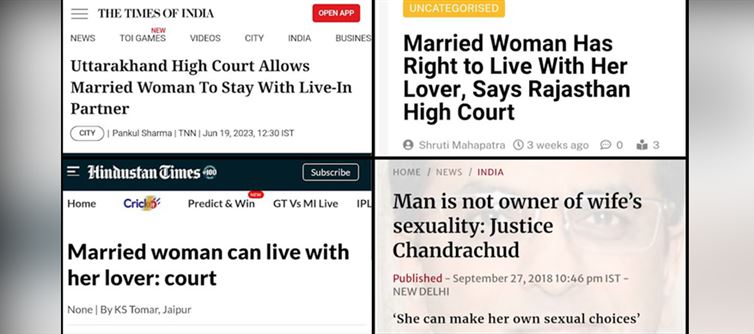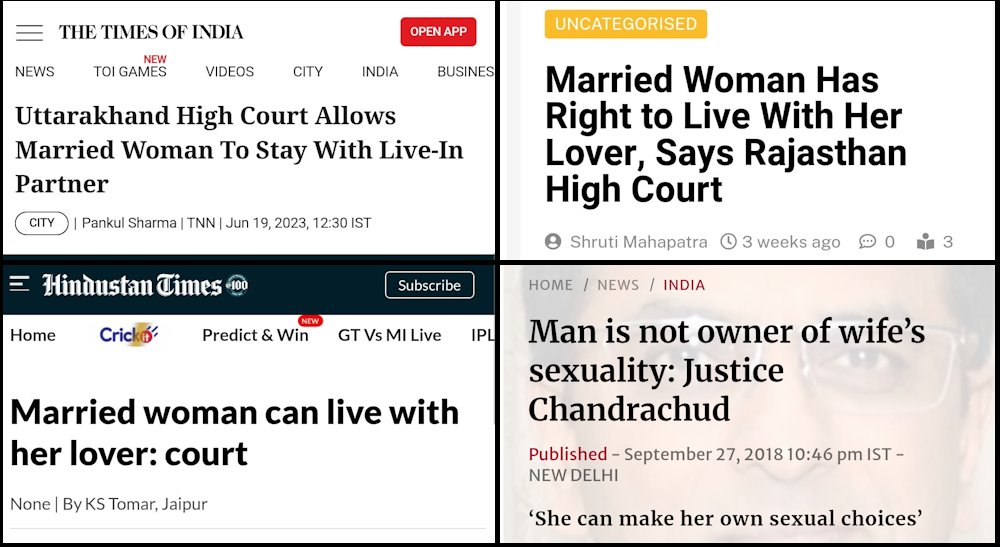
A recent ruling by the uttarakhand high court allowing a married woman to live with her live-in partner has ignited a heated debate across india, particularly on social media platforms like X. The decision, highlighted in a post by journalist deepika Narayan Bhardwaj on june 18, 2025, has been accompanied by a collage of related news clippings and judicial opinions, prompting widespread discussion on the evolving nature of marriage, personal freedom, and societal expectations.
The uttarakhand High Court’s decision, reported by The Times of india on june 19, 2023, permitted a married woman to reside with her live-in partner after she alleged mistreatment by her husband. The ruling, delivered by a division bench including Justices Manoj Kumar Tiwari and Pankaj Purohit, marks a significant acknowledgment of individual choice in personal relationships, despite the legal bonds of marriage. This decision aligns with a broader trend of judicial interpretations favoring personal autonomy, as evidenced by similar rulings from the rajasthan high court and statements from supreme court Justice D.Y. Chandrachud.
The collage shared by Bhardwaj includes headlines such as “Uttarakhand high court Allows Married Woman To Stay With Live-In Partner” (The Times of India) and “Married woman can live with her lover: court” (Hindustan Times). Additional clippings reference the rajasthan High Court’s stance that a married woman has the right to live with her lover and Justice Chandrachud’s 2018 observation that a man is not the owner of his wife’s sexuality, affirming a woman’s right to make her own sexual choices.
 Deepika Narayan Bhardwaj’s tweet, captioned “Don't expect Loyalty Because cheating is now Legal,” reflects a critical perspective on the ruling. The post suggests that the decriminalization of adultery—following the supreme Court’s 2018 judgment striking down Section 497 of the indian Penal Code—and subsequent court decisions may undermine the traditional concept of marital fidelity. The inclusion of diverse judicial opinions in the collage underscores the complexity of the issue, blending progressive legal interpretations with societal backlash.
Deepika Narayan Bhardwaj’s tweet, captioned “Don't expect Loyalty Because cheating is now Legal,” reflects a critical perspective on the ruling. The post suggests that the decriminalization of adultery—following the supreme Court’s 2018 judgment striking down Section 497 of the indian Penal Code—and subsequent court decisions may undermine the traditional concept of marital fidelity. The inclusion of diverse judicial opinions in the collage underscores the complexity of the issue, blending progressive legal interpretations with societal backlash.
The tweet has elicited a range of responses on X. Some users, like Yeshwanth and R. Tarun, argue that the law now appears to favor women in cases of infidelity, citing the madras High Court’s ruling that a husband can be jailed for an extramarital affair if it causes mental cruelty. Others, including Adv. vivek Mohla and sumit have expressed frustration, accusing the judiciary of eroding the institution of marriage and contributing to a rise in extramarital affairs. More extreme reactions, such as those from Jay and DarkImmortalRuler, call for drastic measures, reflecting the depth of public discontent.
Legal scholars note that these rulings reflect a shift toward constitutional morality over traditional social norms, a principle championed by Justice Chandrachud. However, sociologists warn that such changes may exacerbate gender tensions and challenge the cultural fabric of indian society, where marriage has historically been a cornerstone of social stability. The debate mirrors global discussions on personal freedom versus collective values, with India’s diverse cultural landscape adding unique layers to the conversation.
The uttarakhand High Court’s decision, reported by The Times of india on june 19, 2023, permitted a married woman to reside with her live-in partner after she alleged mistreatment by her husband. The ruling, delivered by a division bench including Justices Manoj Kumar Tiwari and Pankaj Purohit, marks a significant acknowledgment of individual choice in personal relationships, despite the legal bonds of marriage. This decision aligns with a broader trend of judicial interpretations favoring personal autonomy, as evidenced by similar rulings from the rajasthan high court and statements from supreme court Justice D.Y. Chandrachud.
The collage shared by Bhardwaj includes headlines such as “Uttarakhand high court Allows Married Woman To Stay With Live-In Partner” (The Times of India) and “Married woman can live with her lover: court” (Hindustan Times). Additional clippings reference the rajasthan High Court’s stance that a married woman has the right to live with her lover and Justice Chandrachud’s 2018 observation that a man is not the owner of his wife’s sexuality, affirming a woman’s right to make her own sexual choices.
 Deepika Narayan Bhardwaj’s tweet, captioned “Don't expect Loyalty Because cheating is now Legal,” reflects a critical perspective on the ruling. The post suggests that the decriminalization of adultery—following the supreme Court’s 2018 judgment striking down Section 497 of the indian Penal Code—and subsequent court decisions may undermine the traditional concept of marital fidelity. The inclusion of diverse judicial opinions in the collage underscores the complexity of the issue, blending progressive legal interpretations with societal backlash.
Deepika Narayan Bhardwaj’s tweet, captioned “Don't expect Loyalty Because cheating is now Legal,” reflects a critical perspective on the ruling. The post suggests that the decriminalization of adultery—following the supreme Court’s 2018 judgment striking down Section 497 of the indian Penal Code—and subsequent court decisions may undermine the traditional concept of marital fidelity. The inclusion of diverse judicial opinions in the collage underscores the complexity of the issue, blending progressive legal interpretations with societal backlash.The tweet has elicited a range of responses on X. Some users, like Yeshwanth and R. Tarun, argue that the law now appears to favor women in cases of infidelity, citing the madras High Court’s ruling that a husband can be jailed for an extramarital affair if it causes mental cruelty. Others, including Adv. vivek Mohla and sumit have expressed frustration, accusing the judiciary of eroding the institution of marriage and contributing to a rise in extramarital affairs. More extreme reactions, such as those from Jay and DarkImmortalRuler, call for drastic measures, reflecting the depth of public discontent.
Legal scholars note that these rulings reflect a shift toward constitutional morality over traditional social norms, a principle championed by Justice Chandrachud. However, sociologists warn that such changes may exacerbate gender tensions and challenge the cultural fabric of indian society, where marriage has historically been a cornerstone of social stability. The debate mirrors global discussions on personal freedom versus collective values, with India’s diverse cultural landscape adding unique layers to the conversation.




 click and follow Indiaherald WhatsApp channel
click and follow Indiaherald WhatsApp channel